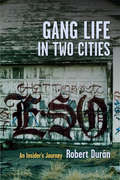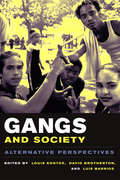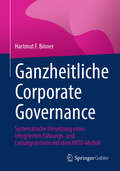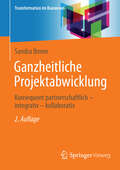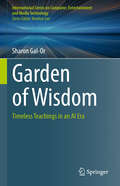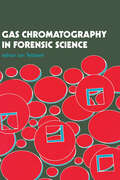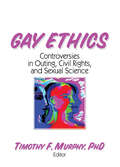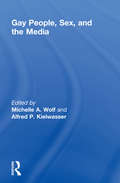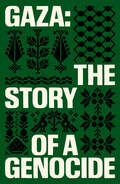- Table View
- List View
Gandhi on Non-Violence
by Thomas Merton Mark Kurlansky Mahatma GandhiAn essential compendium for understanding Gandhi's profound legacy. "One has to speak out and stand up for one's convictions. Inaction at a time of conflagration is inexcusable."--Mahatma Gandhi The basic principles of Gandhi's philosophy of non-violence (Ahimsa) and non-violent action (Satyagraha) were chosen by Thomas Merton for this volume in 1965. In his challenging Introduction, "Gandhi and the One-Eyed Giant," Merton emphasizes the importance of action rather than mere pacifism as a central component of non-violence, and illustrates how the foundations of Gandhi's universal truths are linked to traditional Hindu Dharma, the Greek philosophers, and the teachings of Christ and Thomas Aquinas. Educated as a Westerner in South Africa, it was Gandhi's desire to set aside the caste system as well as his political struggles in India which led him to discover the dynamic power of non-cooperation. But, non-violence for Gandhi "was not simply a political tactic," as Merton observes: "the spirit of non-violence sprang from an inner realization of spiritual unity in himself." Gandhi's politics of spiritual integrity have influenced generations of people around the world, as well as civil rights leaders from Martin Luther King, Jr. and Steve Biko to Václav Havel and Aung San Suu Kyi. Mark Kurlansky has written an insightful preface for this edition that touches upon the history of non-violence and reflects the core of Gandhi's spiritual and ethical doctrine in the context of current global conflicts.
Gang Injunctions and Abatement: Using Civil Remedies to Curb Gang-Related Crimes
by Matthew D. O'DeaneAs gang violence continues to rise across the country and the world, police departments, prosecutors, and community members are seeking new methods to reduce the spread of gang-related criminal activity. Civil gang injunctions have become a growing feature of crime control programs in several states across the nation. Gang Injunctions and Abatement
Gang Life in Two Cities: An Insider's Journey
by Robert J. DuránRefusing to cast gangs in solely criminal terms, Robert J. Durán, a former gang member turned scholar, recasts such groups as an adaptation to the racial oppression of colonization in the American Southwest. Developing a paradigm rooted in ethnographic research and almost two decades of direct experience with gangs, Durán completes the first-ever study to follow so many marginalized groups so intensely for so long, revealing their core characteristics, behavior, and activities within two unlikely American cities.Durán spent five years in Denver, Colorado, and Ogden, Utah, conducting 145 interviews with gang members, law enforcement officers, prosecutors, and other relevant individuals. From his research, he constructs a comparative outline of the emergence and criminalization of Latino youth groups, the ideals and worlds they create, and the reasons for their persistence. He also underscores the failures of violent gang suppression tactics, which have only further entrenched these groups within the barrio. Encouraging cultural activists and current and former gang members to pursue grassroots empowerment, Durán proposes new solutions to racial oppression that challenge and truly alter the conditions of gang life.
Gangs and Girls
by Patrice Corriveau Michel DoraisThey discuss how young men are drawn to gang life, how young girls become attracted and attached to the gang members who eventually sell them into prostitution, and why it is so hard to infiltrate and dismantle the distinct but interrelated worlds of the procurer, victim, and client. Rooted firmly in first person testimony, this research deepens our understanding of juvenile prostitution by identifying and exploring the types of motivations and circumstances that lead teenagers into prostitution rings.
Gangs and Girls: Understanding Juvenile Prostitution
by Patrice Corriveau Michel DoraisThey discuss how young men are drawn to gang life, how young girls become attracted and attached to the gang members who eventually sell them into prostitution, and why it is so hard to infiltrate and dismantle the distinct but interrelated worlds of the procurer, victim, and client. Rooted firmly in first person testimony, this research deepens our understanding of juvenile prostitution by identifying and exploring the types of motivations and circumstances that lead teenagers into prostitution rings.
Gangs and Organized Crime
by George W. Knox Gregg Etter Carter F. SmithIn <i>Gangs and Organized Crime</i>, George W. Knox, Gregg W. Etter, and Carter F. Smith offer an informed and carefully investigated examination of gangs and organized crime groups, covering street gangs, prison gangs, outlaw motorcycle gangs, and organized crime groups from every continent. The authors have spent decades investigating gangs as well as researching their history and activities, and this dual professional-academic perspective informs their analysis of gangs and crime groups. They take a multi-disciplinary approach that combines criminal justice, public policy and administration, law, organizational behavior, sociology, psychology, and urban planning perspectives to provide insight into the actions and interactions of a variety of groups and their members. This textbook is ideal for criminal justice and sociology courses on gangs as well as related course topics like gang behavior, gang crime and the inner city, organized crime families, and transnational criminal groups. <i>Gangs and Organized Crime</i> is also an excellent addition to the professional’s reference library or primer for the general reader.
Gangs and Society: Alternative Perspectives
by David C. Brotherton Luis Barrios Louis KontosThis volume addresses timely questions from an eclectic range of positions and brings together the work of academics, activists, and community leaders to examine the many functions and faces of gangs today. Analyzing the spread of gangs from New York to Texas to the West Coast, the book covers such topics as the spirituality of gangs, the place of women in gang culture, and the effect on gangs of a variety of educational programs and services for at-risk youth.
Gangs and Society: Alternative Perspectives
by David C. Brotherton Luis Barrios Eds. Kontos LouisCompiled by three leading experts in the psychological, sociological, and criminal justice fields, this volume addresses timely questions from an eclectic range of positions. The product of a landmark conference on gangs, Gangs and Society brings together the work of academics, activists, and community leaders to examine the many functions and faces of gangs today. Analyzing the spread of gangs from New York to Texas to the West Coast, the book covers such topics as the spirituality of gangs, the place of women in gang culture, and the effect on gangs of a variety of educational programs and services for at-risk youth. The final chapter examines the "gang-photography phenomenon" by looking at the functions and politics of different approaches to gang photography and features a photographic essay by Donna DeCesare, an award-winning journalist.
Gangs: A Groundwork Guide (Groundwork Guides)
by Richard SwiftA Booklist Editors’ Choice and a Society of School Librarians International (SSLI) Honor Book Street gangs have exploded worldwide. Tattoos, baggy pants, tagging, gangsta style, the unspoken threat -- it's all just around the corner in most of the world's major cities. From the streets of Los Angeles to the shantytowns of Cape Town, hundreds of thousands of "at risk" youth are deciding whether they should join their local gang. Violence, guns, the drug trade, racism, poverty, families under pressure and ever-widening slums all provide a witch's brew in which the youth gang tempts young males and females with a sense of identity and belonging that their world has denied them. Gangs exposes the roots of the problem as it moves from the banlieues of France to the favelas of Brazil. It offers a startling analysis of the complicity of the official adult world and some controversial ideas for reforms that might just undermine the appeal of gang life. For many of the world's young -- especially those who are poor -- joining a gang is a real career choice. It is a choice that can be as deadly for young gangsters as for their victims. Richard Swift shows us that we fail to understand gangs at our peril.
Gangster Hunters: How Hoover's G-men Vanquished America's Deadliest Public Enemies
by John OllerThe enthralling, can't-put-down account of the birth of the modern FBI.J. Edgar Hoover was the face of the FBI. But the federal agents in the field, relentlessly chasing the most notorious gangsters of the 1930s with their own lives on the line, truly transformed the Bureau. In 1932, the FBI lacked jurisdiction over murder cases, bank robberies, and kidnappings. Relegated to the sidelines, agents spent their days at their desks. But all of that changed during the War on Crime. Hunting down infamous public enemies in tense, frequently blood-soaked shootouts, the Bureau was thrust onto the front pages for the first time.Young agents, fresh out of law school and anticipating a quiet, white-collar job, faced off with murderous felons who were heavily armed, clad in bulletproof vests, and owned cars that outraced the best vehicles the Bureau had. But the federal men were fiercely devoted—to the Bureau, to each other, and to bringing America&’s most wanted criminals to justice.The G-men crisscrossed the United States in pursuit of John Dillinger, Bonnie and Clyde, Ma Barker's criminal family, Baby Face Nelson, and Pretty Boy Floyd. But the green FBI agents were always one step behind and a moment too late, the criminals evading elaborate stakeouts and dramatic ambushes. Facing mounting criticism, with bodies left in their wake, the agents had to learn to adapt. After all, more than their reputations were at stake. Through incredible primary source research, John Oller transports readers right to the most harrowing and consequential raids of the 1930s, with fast-paced action that shows the lengths both sides would go to win.
Gangsters Bancario$ Internacionales
by Juliana Arango James Morcan Lance MorcanDescripción del libro: ¿Quieres saber quién se encuentra manipulando ahora mismo los mercados financieros en secreto? ¡Entonces síguele el rastro al dinero! Gángster$ Bancario$ Internacionales identifica a los responsables de la enorme brecha financiera que separa al 1% de la población del resto del común de las personas, que representan el 99%. Entre los amos financieros que se ponen al descubierto en este libro se incluyen personas influyentes en los bancos de Wallstreet, en los bancos centrales europeos, en la Reserva Federal de los EE. UU., y en el Banco del Vaticano, así como en dinastías bancarias como las familias Rothschild y Rockefeller. Gángster$ Bancario$ Internacionales revela las verdaderas razones que llevaron a la oleada de crisis financieras recientes. Tales razones incluyen: el mundo secreto del “dinero negro” y el dinero del Viejo Mundo, cuyos mayores activos e ingresos permanecen sin ser declarados; el Sistema bancario central y la verdadera naturaleza de la Reserva Federal; las actividades financieras no tan santas del Vaticano; el FMI y el Banco Mundial y sus poco caritativos acuerdos con el Tercer Mundo; las medidas de austeridad que en la actualidad están siendo aplicadas sobre naciones vulnerables como Grecia; así como la teoría según la cual el suministro mundial de dinero proviene esencialmente de la nada. Más allá de identificar los problemas y de poner al descubierto la corrupción, Gángster$ Bancario$ Internacionales propone ideas para la creación de un sistema económico más justo. Estas ideas incluyen: bancos de propiedad pública; algunos aspectos típicos de la banca islámica que podrían resultar compatibles con los sistemas bancarios de Occidente; explorar si el capitalismo y el socialismo pueden de hecho funcionar en conjunto; abogar por mantener un capitalismo reestructurado; considerar los méritos de la existencia de un ingreso universal; y predecir las form
Gangsters to Governors: The New Bosses of Gambling in America
by David ClaryGenerations ago, gambling in America was an illicit activity, dominated by gangsters like Benny Binion and Bugsy Siegel. Today, forty-eight out of fifty states permit some form of legal gambling, and America’s governors sit at the head of the gaming table. But have states become addicted to the revenue gambling can bring? And does the potential of increased revenue lead them to place risky bets on new casinos, lotteries, and online games? In Gangsters to Governors, journalist David Clary investigates the pros and cons of the shift toward state-run gambling. Unearthing the sordid history of America’s gaming underground, he demonstrates the problems with prohibiting gambling while revealing how today’s governors, all competing for a piece of the action, promise their citizens payouts that are rarely delivered. Clary introduces us to a rogue’s gallery of colorful characters, from John “Old Smoke” Morrissey, the Irish-born gangster who built Saratoga into a gambling haven in the nineteenth century, to Sheldon Adelson, the billionaire casino magnate who has furiously lobbied against online betting. By exploring the controversial histories of legal and illegal gambling in America, he offers a fresh perspective on current controversies, including bans on sports and online betting. Entertaining and thought-provoking, Gangsters to Governors considers the past, present, and future of our gambling nation. Author's website (http://www.davidclaryauthor.com)
Ganzheitliche Corporate Governance: Systematische Umsetzung eines integrierten Führungs- und Leitungssystems mit dem MITO-Modell
by Hartmut F. BinnerDas Buch vermittelt einen ganzheitlichen prozessorientierten Organisationsgestaltungs- und Corporate-Governance-Ansatz als Führungs- und Leitungsinstrument in Unternehmen. Das Ziel des allgemeingültigen und systematischen Konzeptes ist es, alle relevanten Governance-Themen über einen einheitlichen regelkreisorientierten Ordnungsrahmen abzubilden. Neben den juristischen, politischen und gesellschaftlichen Regeln und Rahmenbedingungen sollen vor allem organisatorische Governanceanforderungen bei der Erstellung von Produkt- oder Dienstleistungen innerhalb der horizontalen Wertschöpfungskette effektiv und effizient erfüllt werden. Das vom Autor in der Praxis erprobte MITO-Modell dient dabei als Meta- bzw. Referenzmodell. Es besteht aus den fünf Modellsegmenten „Führung, Input, Transformation, Output, Leitung“ und bildet den Ordnungsrahmen für die integrierte Strukturierung, Analyse, Gestaltung, Modellierung, Beschreibung und Bewertung desunternehmensspezifischen Organisationssystems. Mit dem MITO-Methoden-Tool als anwendungsunabhängigem digitalen Methoden-Werkzeugkasten können die in den Gesetzen und Normen geforderten Nachweise digital aufbereitet werden. Der Autor erläutert das MITO-Modell anhand vieler anschaulicher Abbildungen Schritt für Schritt.
Ganzheitliche Projektabwicklung: Konsequent partnerschaftlich - integrativ - kollaborativ
by Sandra IbromGanzheitliche Projektabwicklung ist eine grundlegend neue Philosophie und Herangehensweise wie Baurojekte jeder Größenordnung menschlich und daher auch wirtschaftlich erfolgreich abgewickelt werden können. Dabei wird aktuelles Management-, Führungs- sowie Kommunikationswissen zusammengeführt und durch radikal vereinfachte und kooperationsfreundliche Vertragsgestaltungen rechtlich gestützt. Sie ist die Grundlage einer neuen Kultur in der Projektabwicklung. Durch den umfassenden mediativen Ansatz wird der notwendige Umkehrprozess ermöglicht, weg von dem bisherigen Gegeneinander und hin zu einer für alle Beteiligten und Betroffenen gewinnbringenden Zusammenarbeit. So macht Arbeiten in Bauprojekten wieder Spaß und ermöglicht nachhaltige Wertschöpfung im und durch das Projekt.
Ganzheitliche Projektabwicklung: Konsequent partnerschaftlich - integrativ - kollaborativ (Transformation im Bauwesen)
by Sandra IbromGanzheitliche Projektabwicklung ist eine grundlegend neue Philosophie und Herangehensweise wie Baurojekte jeder Größenordnung menschlich und daher auch wirtschaftlich erfolgreich abgewickelt werden können. Dabei wird aktuelles Management-, Führungs- sowie Kommunikationswissen zusammengeführt und durch radikal vereinfachte und kooperationsfreundliche Vertragsgestaltungen und Ausschreibungen rechtlich gestützt. Sie ist die Grundlage einer neuen Kultur in der Projektabwicklung. Durch den umfassenden mediativen Ansatz wird der notwendige Transformationsprozess ermöglicht, weg von dem bisherigen Gegeneinander und hin zu einer für alle Beteiligten und Betroffenen gewinnbringenden Zusammenarbeit. So macht Arbeiten in Bauprojekten wieder Spaß und ermöglicht nachhaltige Wertschöpfung im und durch das Projekt
Garbage Wars: The Struggle For Environmental Justice In Chicago (Urban And Industrial Environments Ser.)
by David PellowIn Garbage Wars, the sociologist David Pellow describes the politics of garbage in Chicago. He shows how garbage affects residents in vulnerable communities and poses health risks to those who dispose of it. He follows the trash, the pollution, the hazards, and the people who encountered them in the period 1880-2000. What unfolds is a tug of war among social movements, government, and industry over how we manage our waste, who benefits, and who pays the costs. Studies demonstrate that minority and low-income communities bear a disproportionate burden of environmental hazards. Pellow analyzes how and why environmental inequalities are created. He also explains how class and racial politics have influenced the waste industry throughout the history of Chicago and the United States. After examining the roles of social movements and workers in defining, resisting, and shaping garbage disposal in the United States, he concludes that some environmental groups and people of color have actually contributed to environmental inequality. By highlighting conflicts over waste dumping, incineration, landfills, and recycling, Pellow provides a historical view of the garbage industry throughout the life cycle of waste. Although his focus is on Chicago, he places the trends and conflicts in a broader context, describing how communities throughout the United States have resisted the waste industry's efforts to locate hazardous facilities in their backyards. The book closes with suggestions for how communities can work more effectively for environmental justice and safe, sustainable waste management.
Garden of Wisdom: Timeless Teachings in an AI Era (International Series on Computer, Entertainment and Media Technology)
by Sharon Gal-OrGarden of Wisdom: Timeless Teachings in an AI Era is a transformative exploration of the intersection between ancient wisdom and modern technology. This book offers a comprehensive framework for the ethical evolution of artificial intelligence, integrating timeless principles from biblical narratives, ecological systems, and quantum consciousness. The book introduces groundbreaking concepts like Angelic Intelligence (AI), Nature Intelligence (NI), and regenerative design, urging readers to harmonize technological advancements with sustainability and human dignity. It addresses the challenges of the AI era with actionable strategies such as the Kosmic Tree of Life and Circadian AI, fostering a vision of a future guided by ethics and interconnectedness. Garden of Wisdom is not just a guide for AI professionals but a call to humanity to co-create a flourishing, sustainable world.
Gardens and Neighbors: Private Water Rights in Roman Italy
by Cynthia Jordan Bannon"Gardens and Neighborswill provide an important building block in the growing body of literature on the ways that Roman law, Roman society, and the economic concerns of the Romans jointly functioned in the real world." --Michael Peachin, New York University. As is increasingly true today, fresh water in ancient Italy was a limited resource, made all the more precious by the Roman world's reliance on agriculture as its primary source of wealth. From estate to estate, the availability of water varied, in many cases forcing farmers in need of access to resort to the law. In Gardens and Neighbors: Private Water Rights in Roman Italy, Cynthia Bannon explores the uses of the law in controlling local water supplies. She investigates numerous issues critical to rural communities and the Roman economy. Her examination of the relationship between farmers and the land helps draw out an understanding of Roman attitudes toward the exploitation and conservation of natural resources and builds an understanding of law in daily Roman life. An editor of the series Law and Society in the Ancient World, Cynthia Jordan Bannon is also Associate Professor of Classical Studies at Indiana University, Bloomington. Her previous book was The Brothers of Romulus: Fraternal Pietas in Roman Law, Literature, and Society(1997). Visit the author's website: http://www.iub.edu/~classics/faculty/bannon.shtml.
Gas Chromatography In Forensic Science
by I. TebbettDescribes the application of gas chromatography to various aspects of forensic chemistry. Following an introduction to the basic theory of chromatographic separations, the text discusses specific issues, such as drug analysis, fires and explosives, alcohol and toxicology.
Gateway to the Epicureans: Epicurus, Lecretius, and their Modern Heirs
by Lucretius EpicurusThe Greek Philosopher behind Nearly Every Bad Idea
Gateway to the Stoics: Marcus Aurelius's Meditations, Epictetus's Enchiridion, and Selections from Seneca's Letters
by Epictetus Marcus Aurelius SenecaThe one book you need to master stoic philosophy!This classic collection, newly revised and with a foreword by classicist Spencer Klavan, includes the famed original introduction by Russell Kirk, the full text of the Meditations of Marcus Aurelius, the complete Enchiridion of Epictetus, and key selections from Seneca and Hierocles of Alexandria in one compact volume.
Gay Ethics: Controversies in Outing, Civil Rights, and Sexual Science
by Timothy F MurphyGay Ethics is an anthology that addresses ethical questions involving key moral issues of today--sexual morality, outing, gay and lesbian marriages, military service, anti-discrimination laws, affirmative action policies, the moral significance of sexual orientation research, and the legacy of homophobia in health care. It focuses on these issues within the social context of the lives of gay men and lesbians and makes evident the ways in which ethics can and should be reclaimed to pursue the moral good for gay men and lesbians.Gay Ethics is a timely book that illustrates the inadequacies of various moral arguments used in regard to homosexuality. This book reaches a new awareness for the standing and treatment of gay men and lesbians in society by moving beyond conventional philosophical analyses that focus exclusively on the morality of specific kinds of sexual acts, the nature of perversion, or the cogency of scientific accounts of the origins of homoeroticism. It raises pertinent questions about the meaning of sexuality for private and public life, civics, and science. Some of the issues covered: Sexual Morality Outing Same-Sex Marriage Military Service Anti-Discrimination Laws Affirmative Action Policy The Scientific Study of Sexual Orientation Bias in Psychoanalysis Homophobia in Health CareGay Ethics presents a wide range of perspectives but remains united in the common purpose of illuminating moral arguments and social policies as they involve homosexuality. The chapters challenge social oppression in the military, civil rights, and the social conventions observed among gay men and lesbians themselves. This book is applicable to a broad range of academics working in gay and lesbian studies and because of its current content, is of interest to an educated lay public. It will be a standard reference point for future discussion of the matters it addresses.
Gay People, Sex, and the Media
by Michelle Wolf Alfred KielwasserHere is a provocative book that examines precisely how and why mass communication has an impact upon the sexual realities of our lives. Written in response to a demand for information that cuts across many of the boundaries found in more traditional books on sexuality and mass communication, Gay People, Sex, and the Media covers a broad range of sexual identity, socialization, and mass communication issues and represents a variety of theoretical and methodological orientations. Although the chapters are diverse, they all focus on how the mass media--television, radio, films, newspapers, magazines, and recorded music--contribute significantly to the very definitions we form of ourselves and of each other. In part, this informative volume discusses and analyzes several concerns regarding minority perspectives in the context of the the study of mass media content and effects; analyzes mediated information about AIDS and highlights the responsibility of the mass media to disseminate more accurate information; addresses the relationships between mass media content (primarily television) and sexual socialization; explores issues confronted by individuals whose sexual orientations are generally perceived as falling out of the mainstream; and provides a selective bibliography of print, aural, and visual resources on gay men, lesbians, and the mass media. Unique in contrast to other books of research on human sexuality and mass communication, Gay People, Sex, and the Media gives more than a passing reference to issues concerning sexual identity and gay and lesbian concerns. Scholars and students of human sexuality, especially those who wish to explore their field from a communications perspective, will find this to be a valuable book. It is also useful to communications researchers and teachers, particularly those studying mediated communications in society, media ethics, and sex and the media. Finally, for professionals involved in creating or monitoring media content or forging public policy and community action programs in response to these issues, this volume serves as an essential sourcebook.
Gay Priori: A Queer Critical Legal Studies Approach to Law Reform
by Libby AdlerLibby Adler offers a comprehensive critique of the mainstream LGBT legal agenda in the United States, showing how LGBT equal rights discourse drives legal advocates toward a narrow array of reform objectives that do little to help the lives of the most marginalized members of the LGBT community.
Gaza: The Story of a Genocide
by Fatima Bhutto Sonia FaleiroAn urgent and powerful collection of personal testimony, poetry, art, and frontline reportage of the genocide in Gaza, told by Palestinians.Gaza: The Story of a Genocide is Together, bears witness to the vast and ongoing destruction inflicted on the Palestinian people—their lives, their land, and their future.Ahmed Alnaouq recounts the devastating loss of twenty-one family members. Noor Alyacoubi offers a searing reflection on starvation. Mariam Barghouti examines the brutality of Israeli settler violence in the West Bank, while Eman Bashir describes the phenomenon of a &“wounded child, no surviving family.&” These voices, among many others, illuminate the enduring psychological, physical, and generational toll of state violence.With contributions from recipients of the Palestine Book Award, Arab American Book Award, Pulitzer Prize, Emmy Award, National Book Award, and Gandhi Peace Award, this collection also honors the late poet Hiba Abu Nada—killed in an Israeli airstrike on her home in Khan Younis, Gaza, on October 20, 2023.All royalties will be donated directly to the United Nations Relief and Works Agency (UNRWA) for Palestine Refugees in the Near East.


